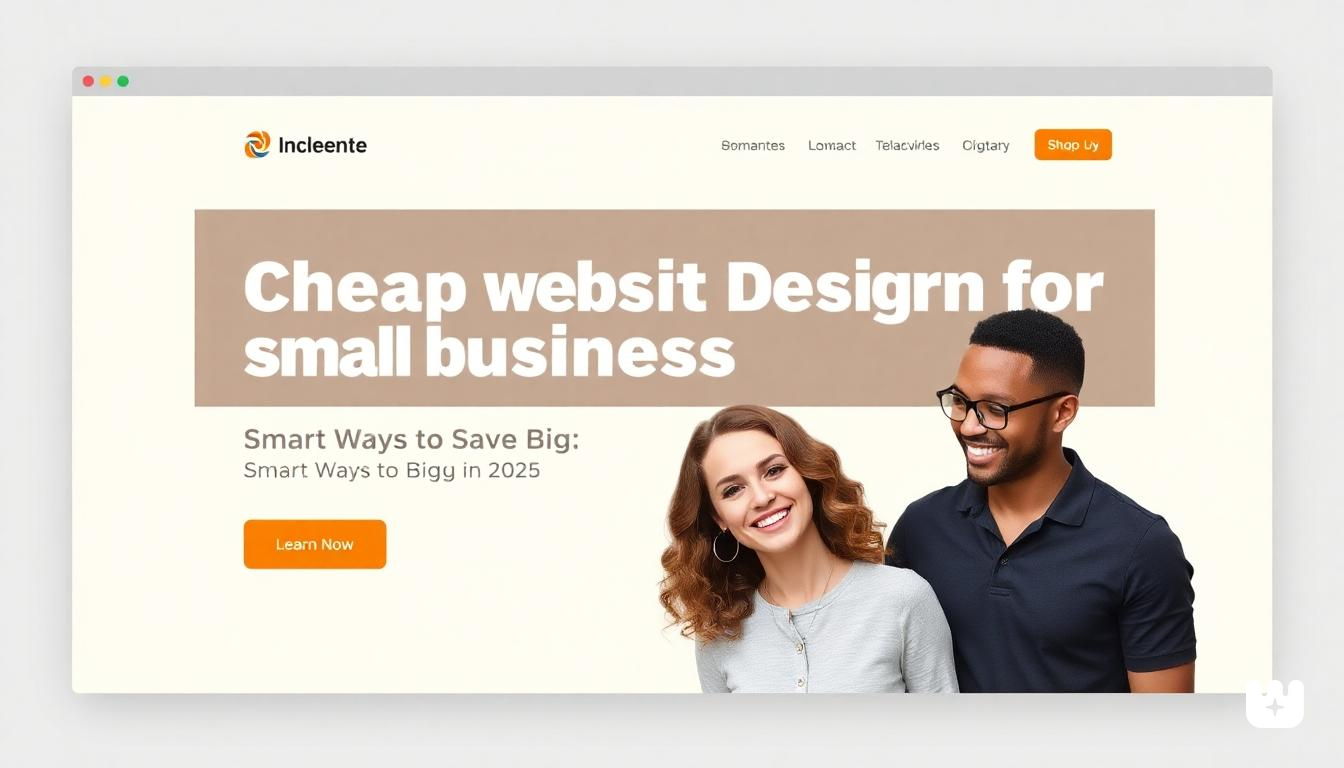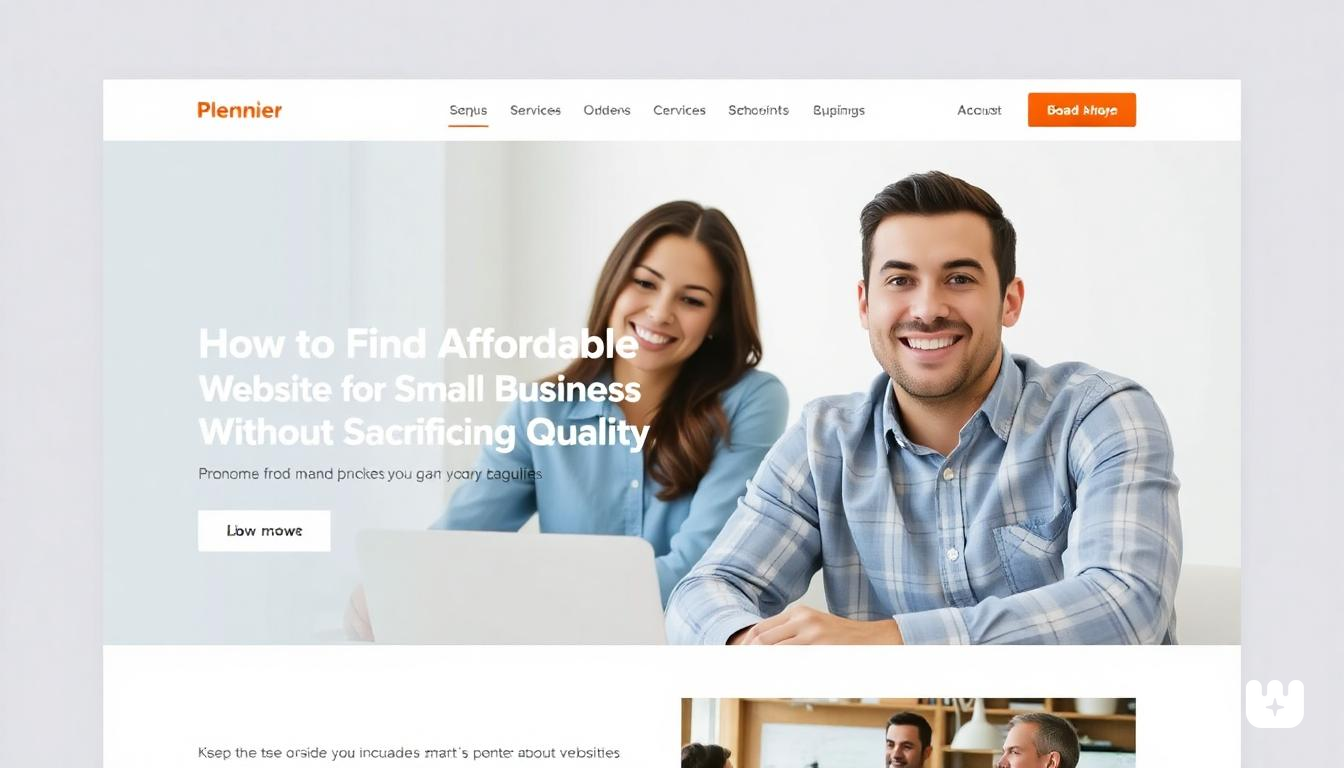In 2025's hyper-digital marketplace, a professional website isn't just nice to have—it's essential for small business credibility and growth. Finding the right website builders for small business needs can dramatically impact your online success, customer acquisition, and bottom line. Today's platforms offer unprecedented ease of use while delivering professional results that previously required expensive developers, putting powerful web presence within reach of even the smallest operations.
As consumers increasingly research businesses online before making purchasing decisions, your website often forms the critical first impression. The good news? Modern website builders have evolved to offer small business owners sophisticated tools without requiring technical expertise. Let's explore how to choose the perfect platform for your specific business needs and budget.
What Makes a Great Website Builder for Small Business?
Before diving into specific platforms, it's important to understand what features truly matter when selecting a website builder for your small business. The right choice depends on your specific requirements, but there are several universal criteria to consider:
Ease of Use
Small business owners often lack time and technical expertise to learn complex systems. The best website builders offer:
- Intuitive drag-and-drop interfaces
- Pre-designed templates you can customize
- No coding requirements (but code access for those who want it)
- Quick setup process (under a day to basic launch)
Affordability
Budget matters, especially for startups and small operations. Consider:
- Monthly subscription costs
- Transaction fees (for e-commerce)
- Hidden costs for essential features
- Scalability pricing as your business grows
Mobile Responsiveness
With over 60% of web traffic now coming from mobile devices, your site must look perfect on smartphones:
- Automatic mobile optimization
- Mobile preview tools
- Touch-friendly navigation elements
- Fast loading on cellular connections
SEO Features
Visibility in search engines drives free organic traffic to your business:
- Custom meta titles and descriptions
- SEO-friendly URL structures
- Schema markup support
- XML sitemap generation
- Page speed optimization tools
E-commerce Capabilities
Even if you're not primarily an online store, selling capabilities matter:
- Product listing functionality
- Payment gateway integration
- Inventory management
- Tax and shipping calculators
- Abandoned cart recovery
Customer Support
When issues arise, quality support becomes invaluable:
- 24/7 availability
- Multiple contact channels (chat, phone, email)
- Comprehensive knowledge base
- Video tutorials and guides
Integration Ecosystem
Your website needs to work with other business tools:
- Email marketing platforms
- Social media connectivity
- CRM systems
- Analytics tools
- Scheduling and booking software
Comparison Table: Top Website Builders for Small Business in 2025
| Website Builder | Starting Price | Best For | Key Features | Ease of Use | Official Site |
|---|---|---|---|---|---|
| Wix | $16/month | All-around flexibility | AI design assistance, 800+ templates, extensive app market | ★★★★★ | Wix.com |
| Shopify | $29/month | E-commerce businesses | Advanced selling tools, inventory management, abandoned cart recovery | ★★★★☆ | Shopify.com |
| Squarespace | $16/month | Visual-focused businesses | Designer templates, built-in photo editing, content blocks | ★★★★☆ | Squarespace.com |
| WordPress.org | $7/month (hosting only) | Content-heavy sites, blogs | Ultimate customization, thousands of plugins, expandability | ★★★☆☆ | WordPress.org |
| Webflow | $14/month | Design-focused businesses | Advanced animations, custom interactions, designer-friendly | ★★★☆☆ | Webflow.com |
| GoDaddy Website Builder | $9.99/month | Quick setup needs | AI business site generator, all-in-one marketing dashboard | ★★★★★ | GoDaddy.com |
| Weebly | $10/month | Budget-conscious businesses | Free tier available, simple store functionality, app center | ★★★★☆ | Weebly.com |
| Strikingly | $8/month | One-page websites | One-page focus, simple store, blog features | ★★★★★ | Strikingly.com |
| Zyro | $8.99/month | AI-assisted design | AI content generator, heatmap tools, logo maker | ★★★★☆ | Zyro.com |
| BigCommerce | $29.95/month | Scaling e-commerce | Multi-channel selling, no transaction fees, B2B features | ★★★☆☆ | BigCommerce.com |
Best Website Builders for Small Businesses in 2025
Let's take a closer look at each platform to help you determine which website builder aligns best with your specific business needs.
1. Wix
Overview: Wix continues to dominate the small business website builder market in 2025 with its combination of flexibility, features, and ease of use. Its AI-powered design assistance has evolved significantly, now offering industry-specific suggestions and conversion optimization recommendations.
Pros:
- Truly drag-and-drop interface with precise positioning
- Extensive template library with over 800 professionally designed options
- Robust app marketplace for extending functionality
- Strong e-commerce capabilities with multiple payment options
- Advanced SEO tools built into the platform
- AI design assistant that builds custom sites based on your preferences
Cons:
- Cannot switch templates after site creation
- Can become expensive with premium apps and features
- Editor can feel overwhelming with too many options
Key Features:
- Wix ADI (Artificial Design Intelligence) for automated site creation
- Wix Velo for custom code and functionality
- Integrated booking system for service businesses
- Custom animations and scroll effects
- Advanced security with automatic SSL certificates
Suggested image alt text: "Wix website builder dashboard showing template selection for small businesses"
2. Shopify
Overview: For small businesses focused primarily on selling products, Shopify remains the gold standard in 2025. Its purpose-built e-commerce functionality handles everything from inventory to shipping, while maintaining surprising ease of use.
Pros:
- Purpose-built for online selling with all necessary e-commerce tools
- Excellent inventory management system
- Abandoned cart recovery to capture lost sales
- Point-of-sale integration for brick-and-mortar locations
- Extensive payment gateway options
- Large ecosystem of apps and plugins
Cons:
- Higher starting price than general website builders
- Transaction fees if not using Shopify Payments
- Less flexible for non-e-commerce content than some competitors
Key Features:
- Multi-channel selling across social media and marketplaces
- Automatic tax calculation
- Discount code creation
- Customer account management
- Advanced analytics and sales reporting
Suggested image alt text: "Shopify e-commerce dashboard showing sales analytics for small business"
3. Squarespace
Overview: Squarespace continues to excel for visually-focused businesses in 2025, with templates that showcase photography, design work, and creative portfolios beautifully. Its all-in-one approach eliminates the need for multiple subscriptions and plugins.
Pros:
- Stunning, professionally designed templates
- Built-in photo editing and gallery management
- All features included (no upsells or required third-party apps)
- Excellent blogging capabilities
- Integrated email marketing tools
- Professional typography and design controls
Cons:
- Less flexible than some competitors for layout customization
- Steeper learning curve than simpler builders
- Limited third-party integrations compared to WordPress
Key Features:
- Member areas for subscriber content
- Scheduling tools for service businesses
- Customizable forms and popups
- Restaurant-specific features like menus and reservations
- Advanced analytics with conversion tracking
Suggested image alt text: "Squarespace template customization interface for visual business websites"
4. WordPress.org (with Hosting)
Overview: WordPress powers over 40% of the internet and remains the most flexible, powerful option for small businesses willing to invest a bit more time in setup. Modern page builders like Elementor and Divi have simplified the process considerably.
Pros:
- Ultimate customization potential
- Thousands of themes and plugins (both free and premium)
- Complete ownership of your website and data
- Excellent for SEO and content marketing
- Scales from simple blogs to enterprise-level websites
- No monthly fees beyond hosting
Cons:
- Steeper learning curve than dedicated website builders
- Requires separate hosting purchase
- Security and updates require regular maintenance
- Can become complex with multiple plugins
Key Features:
- Unlimited design flexibility with page builders
- WooCommerce for powerful e-commerce functionality
- Advanced user roles and permissions
- Multilingual capabilities
- Membership and subscription options
Suggested image alt text: "WordPress dashboard with Elementor page builder for small business website creation"
5. Webflow
Overview: Webflow has gained significant traction with design-focused small businesses by offering developer-level control through a visual interface. It excels at creating highly custom, interactive websites without coding.
Pros:
- Exceptional design flexibility and precision
- Clean code output that loads quickly
- Advanced animations and interactions
- CMS capabilities for dynamic content
- Powerful e-commerce features
- Developer-like control without coding
Cons:
- Steeper learning curve than most website builders
- Higher pricing for full features
- Can be overwhelming for simple website needs
Key Features:
- Visual CSS grid editor
- Custom animations and interactions
- CMS collections for dynamic content
- Responsive design controls
- Direct code export options
Suggested image alt text: "Webflow designer interface showing responsive design controls for small business websites"
6. GoDaddy Website Builder
Overview: GoDaddy's Website Builder has evolved significantly, positioning itself as the fastest path from no website to online presence. Their focus on AI-assisted design and all-in-one marketing tools makes it particularly suitable for time-strapped business owners.
Pros:
- Extremely quick setup process
- AI-powered content and design suggestions
- Built-in marketing and SEO tools
- Simple interface with minimal learning curve
- Integrated with GoDaddy's ecosystem (domains, email, etc.)
Cons:
- Limited design flexibility compared to other platforms
- Fewer templates than competitors
- Basic e-commerce functionality
Key Features:
- GoDaddy InSight for marketing recommendations
- Social media integration and management
- Email marketing tools included
- Appointment scheduling capabilities
- One-click business listing management
Suggested image alt text: "GoDaddy Website Builder showing AI-assisted small business website creation"
7. Weebly
Overview: Now owned by Square, Weebly offers an affordable entry point for small businesses, with a free tier that's actually usable. Their integration with Square's payment processing makes it particularly appealing for businesses that sell both online and in person.
Pros:
- User-friendly drag-and-drop editor
- Free tier available for basics
- Strong integration with Square payments and POS
- Built-in marketing tools
- Good value for money
Cons:
- Fewer templates and design options than competitors
- Limited design flexibility
- Some advanced features require third-party apps
Key Features:
- Integrated shipping calculator
- Inventory tracking
- Digital goods selling capability
- Square POS integration
- SEO tools and analytics
Suggested image alt text: "Weebly's affordable website builder interface with e-commerce setup for small business"
8. Strikingly
Overview: Strikingly specializes in beautiful one-page websites, making it perfect for businesses that need a simple online presence or landing page. Their focus on simplicity makes them one of the most approachable platforms for complete beginners.
Pros:
- Extremely easy to use
- Perfect for single-page websites
- Modern, mobile-optimized designs
- Simple store functionality
- Audience interaction tools (comments, forms, etc.)
Cons:
- Limited for multi-page websites
- Basic e-commerce capabilities
- Fewer integrations than larger platforms
Key Features:
- Simple Store for basic e-commerce
- Built-in blog functionality
- Contact forms and popups
- Social feed integration
- Mobile site editor
Suggested image alt text: "Strikingly one-page website editor showing mobile preview for small business"
9. Zyro
Overview: Zyro has carved out a niche as an AI-powered website builder focused on simplicity and marketing tools. Their AI-generated content tools help businesses overcome the blank page problem when creating websites.
Pros:
- AI tools for content generation
- Very affordable pricing
- Clean, modern templates
- Simple interface for beginners
- Fast loading websites
Cons:
- Newer platform with fewer templates
- Limited app integrations
- Less name recognition than competitors
Key Features:
- AI Writer for generating business content
- AI Heatmap for predicting visitor behavior
- Logo maker and brand toolkit
- SEO toolbox
- Free hosting and domain (first year)
Suggested image alt text: "Zyro AI website builder generating content for small business websites"
10. BigCommerce
Overview: BigCommerce rounds out our list as the most robust enterprise-level e-commerce platform that remains accessible to small businesses planning for growth. It offers powerful selling tools without transaction fees.
Pros:
- Scalable from small business to enterprise
- No transaction fees on any plan
- Multi-channel selling capabilities
- B2B features available
- Abandoned cart recovery included in all plans
Cons:
- Higher learning curve than simpler platforms
- More expensive starting point
- Can be overwhelming for very small businesses
Key Features:
- Unlimited products, file storage, and bandwidth
- Advanced product filtering
- Built-in ratings and reviews
- Customer segmentation tools
- Professional reporting suite
Suggested image alt text: "BigCommerce dashboard showing multi-channel selling options for growing small businesses"
DIY vs Hiring a Web Designer: What Should You Choose?
While website builders have made DIY website creation more accessible than ever, the decision between building your own site and hiring a professional remains important. Here's a balanced comparison to help you decide:
DIY Website Building
Advantages:
- Significantly lower upfront costs
- Complete control over the process and timeline
- Intimate knowledge of how to update your site
- Satisfaction of creating something yourself
- No communication delays or misunderstandings
Disadvantages:
- Time-intensive learning curve
- Potential for amateur-looking design
- Limited by your own technical and design skills
- No strategic guidance from an experienced professional
- Responsibility for troubleshooting all issues
Best for:
- Businesses with very limited budgets
- Entrepreneurs who enjoy learning new technical skills
- Simple website needs without complex functionality
- Situations requiring frequent, immediate updates
- Testing a concept before investing more heavily
Professional Web Designer
Advantages:
- Expert design that enhances your brand
- Strategic approach to user experience
- Time savings (focus on running your business)
- Custom functionality beyond template capabilities
- Professional guidance on best practices
- Technical support and maintenance
Disadvantages:
- Higher upfront investment
- Potential for communication challenges
- Dependency on designer for some updates
- Longer timeline for revisions and changes
- Finding the right designer can be challenging
Best for:
- Businesses where professional image is crucial
- Complex website requirements
- Companies lacking technical skills in-house
- Situations requiring unique custom functionality
- Businesses that can afford the investment
If you're focused more on affordability and want expert insight, don't miss our Complete 2025 Guide on Affordable Website Design for Small Businesses.
How Tube-Ads.store Can Help You Build a Better Website
For small businesses seeking professional results without the full cost of custom development, Tube-Ads.store offers a unique middle ground. Their specialized small business website packages combine the best aspects of DIY and professional design:
- Expert consultation to understand your specific business needs
- Professional design implementation using your preferred website builder
- SEO optimization from the ground up
- Training on how to maintain and update your site yourself
- Ongoing support when you need expert help
Whether you choose DIY with guidance or a fully managed solution, Tube-Ads.store tailors their approach to your technical comfort level and business goals. Explore Tube-Ads.store's website solutions to see how they can help your small business establish a professional online presence without breaking your budget.
Conclusion: Choosing the Right Website Builder for Your Small Business
The best website builder for your small business depends on your specific needs, technical comfort level, budget, and growth plans. Here are some final recommendations to guide your decision:
- For maximum ease of use and flexibility: Wix offers the best balance of simplicity and features for most small businesses.
- For e-commerce focus: Shopify provides the most comprehensive selling tools, while BigCommerce offers better scalability for rapid growth.
- For visual impact and design: Squarespace delivers the most professional aesthetic with minimal effort.
- For ultimate customization: WordPress.org gives you complete control and ownership, especially when combined with a page builder.
- For the absolute fastest setup: GoDaddy Website Builder can get you online in hours rather than days.
Remember that your website is an investment in your business's digital presence. The right platform should grow with you, supporting your business goals while staying within your budget. Start with your primary requirements—whether that's e-commerce, visual portfolio, booking system, or simple information sharing—and choose the builder that excels in that area.
Most importantly, don't let perfect be the enemy of good. Having a professional-looking website, even a simple one, is far better than having no online presence at all. You can always expand and enhance your site as your business grows and your digital needs evolve.
Need personalized guidance on selecting the right website builder for your specific business? Contact Tube-Ads.store for a free consultation tailored to your industry, goals, and technical needs.


